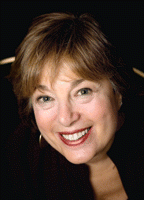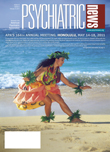We're back in Hawaii after a mere 38 years! APA's 2011 annual meeting will offer an outstanding combination of scientific advances, practice tips and advice, and entertaining sessions in one of the world's most beautiful vacation destinations. The Scientific Program Committee has done outstanding work under the leadership of Drs. Tana Grady-Weliky and Don Hilty.
(Tragically, just weeks before this issue of Psychiatric News went to press, I received news that Dr. Grady-Weliky had passed away. Tana was a dear friend and colleague for many years, and her selfless contributions to APA were many, especially in the area of education. She was truly one of the finest people I have ever known—a shining example of leadership, dedication, and commitment. She was an outstanding role model and will be deeply missed. I will be presenting a special presidential commendation to her family honoring her for her contributions to APA and the field of psychiatry at APA's Convocation of Distinguished Fellows at the annual meeting.)
I selected "Transforming Mental Health Through Leadership, Discovery, and Collaboration" as the meeting's theme. I think you will find the program informative and thought provoking with ample opportunity to enjoy an idyllic setting on the island of Oahu. We have invited the best psychiatrist-scientists from across the country and around the world to teach us about their work in special lectures and symposia.
I am particularly honored to have as the Convocation speaker Archbishop Desmond Tutu, a world-renowned human rights activist and Nobel Peace Prize recipient. Now in semi-retirement, Archbishop Tutu has spent his life working tirelessly to promote peace, justice, and an end to racial divisions throughout the world and, most recently, to campaign against the spread of HIV/AIDS. The official Opening Session will be held earlier than in past years—at 3:30 p.m.—on Sunday, May 15, and the Convocation will be held at that same time the next day.
I'm also excited to have attorney Barry Scheck, co-founder of the Innocence Project, among our special lecturers. The Innocence Project, a nonprofit legal clinic affiliated with the Benjamin N. Cardozo School of Law at Yeshiva University, is dedicated to exonerating wrongfully convicted people through DNA testing and reforming the criminal justice system to prevent future injustice. The group has an impressive record of helping to exonerate more than 200 people to date, including more than a dozen who were scheduled to be executed. Mr. Scheck's lecture is titled "Wrongful Conviction: Challenges for Psychiatry and Forensic Science" and should be both educational and thought provoking.
We are delighted to be partnering once again with the National Institute of Mental Health (NIMH) to highlight how cuttingedge science on mental disorders is informing clinical practice. Lectures by NIMH Director Thomas Insel, M.D., and David Lewis, M.D., director of the Translational Neuroscience Program at the University of Pittsburgh, are headlining the NIMH track (see next issue). Symposia will highlight the latest science (for example, what psychiatrists need to know about neuroscience and brain circuitry) and new developments in the treatment of neurodevelopmental and mood disorders.
We have also scheduled a number of stimulating media workshops; these typically include the presentation of movies or videos. One of the workshops will look at psychiatry in film, "Unconscious Projections: The Portrayal of Psychiatry in Recent American Film," chaired by Steven Pflanz, M.D.
I am also pleased to note that former NIMH Director and APA President Herbert Pardes, M.D., will return as chair of the Advances in Research format. He has organized a panel of outstanding academic and clinical psychiatric researchers who will present the latest research on anxiety disorders in children and adolescents, PTSD, successful cognitive aging, and the depression-diabetes connection. This session will be held Sunday, May 15, from 8 a.m. to 11 a.m.
A number of sessions have been planned for psychiatry residents and medical students (see
Sessions and Events For Residents and Fellows). A new resident poster competition will premiere at the meeting, with competition categories to include policy, service-delivery models, and curricula and psychiatric education, as well as clinical research. In addition, teams of residents will test their knowledge against each other in the fourth annual MindGames competition in a "Jeopardy"-style battle of wits. In the workshop "A Case Study on Mentorship," Joyce Spurgeon, M.D., will lead a discussion on mentorship at three distinct career phases: residency training, early career, and established career. Residents at the workshop will participate in an exercise to facilitate finding their own mentorship opportunities.
I've planned a number of special presidential symposia on topics to which I believe attendees should pay particular attention now because of their current or expected impact on the field. They are "DSM-5: Implications for Child Psychiatry," chaired by Dr. Laurence Greenhill, president of the American Academy of Child and Adolescent Psychiatry; "Psychiatry and Primary Care Collaboration Under Health Care Reform: Sustainable Models That Improve Access and Quality," chaired by Dr. Henry Chung, associate vice president of student health at New York University; "Translating Neuroscience for Advancing Treatment and Prevention of Posttraumatic Stress Disorder," chaired by Dr. Charles Marmar, vice chair and professor of psychiatry at the University of California, San Francisco; and "Teaching Psychodynamic Psychiatry in the Era of Neuroscience," chaired by Dr. Carol Nadelson, director of the Partners Office for Women's Careers at Brigham and Women's Hospital and a former APA president.
We will see the return of the popular "Focus Live" series—interactive learning at its best—which features authors and editors from the APA journal Focus: The Journal of Lifelong Learning in Psychiatry. This year's sessions on treatment-resistant disorders and substance use disorders will help attendees meet practice-improvement goals.
In addition to the Opening Session and Convocation, there are a couple of other scheduling items I want to make you aware of. Please plan to arrive so you can take advantage of the full program.
We will follow the industry standard for professional meetings held in Honolulu: start early (6:30 a.m.), and end early (3 p.m.) This ensures that attendees have time for networking and social activities as well as getting their dose of vitamin D.
APA members will have an exclusive opportunity to register for the meeting and courses on Friday, May 13, from 11 a.m. to noon.
The scientific program starts Saturday, May 14, at 7 a.m. and ends Wednesday, May 18, at 3 p.m.
The APPI Bookstore, Publishers' Bookfair, Member Center, and Career Fair will be open Saturday to Tuesday, May 14 to 17, from 8 a.m. to 3 p.m. Educational and commercial exhibits will be open from Sunday to Tuesday, May 15 to 17, from 8 a.m. to 3 p.m.
A new feature this year, the Annual Meeting Self-Assessment in Psychiatry, is designed to serve several purposes: identify areas in which psychiatrists attending the annual meeting may need improvement, fulfill the self-assessment component of Maintenance of Certification, help shape a learning program for the annual meeting, provide a score and peer comparison, and provide CME credit (see
Self-Assessment Tool Will Help You Plan Meeting Schedule, Earn Credit). Topics will follow the content outline of the American Board of Psychiatry and Neurology Maintenance of Certification examination. After taking the 100-question assessment, psychiatrists will be provided confidential feedback about areas of strength and weakness in their knowledge.
Look for additional articles in this and future issues of
Psychiatric News on scientific sessions, special events, and our host city. The Scientific Program Committee has worked hard to craft a program not only taking stock of where we are in 2011 but looking forward to the future of science and practice. And don't forget to take advantage of the tours that APA has lined up for you (see
Tours Take You Under the Sea and Soaring Over the Island). You can leave the driving to someone else!
I look forward to seeing you in Honolulu!

